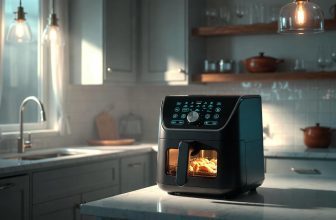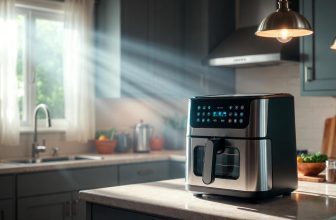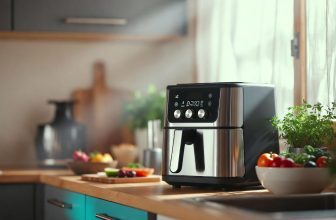As an Amazon Associate I earn from qualifying purchases.
Can Air Fryers Be Toxic?
Can Air Fryers Be Toxic? When exploring the world of modern kitchen appliances, the air fryer stands out as a revolutionary tool, lauded for its ability to deliver crispy food with minimal oil. Yet, the question remains, might these devices pose a hidden risk? Concerns often orbit around the materials used in manufacturing and the chemicals released during cooking.
Historically, nonstick coatings, which some air fryers employ, have sparked debates due to the potential release of hazardous fumes at high temperatures. A pivotal study highlighted that, while trace amounts of toxic elements can occur, they are generally insignificant if the devices are used properly and in accordance with safety guidelines. Ensuring routine maintenance and proper usage can significantly mitigate any associated risks, making air fryers a safe choice for health-conscious consumers.
:max_bytes(150000):strip_icc()/can-air-fryers-cause-cancer-5082537_V2-1c8b96f7299c42618bff639ea6a36c53.jpg)
Unraveling the Concern: Can Air Fryers Be Toxic?
The buzz around air fryers often raises eyebrows due to possible health risks. One concern stems from non-stick coatings that might release harmful fumes. At high temperatures, certain coatings can emit toxic gases, especially if compromised. However, many manufacturers now use safer materials to limit these risks. This innovation highlights their commitment to consumer safety.
Research shows minimal risk when air fryers are used correctly. Studies reveal that only extreme misuse might lead to harmful emissions. Additionally, regular cleaning can prevent residue build-up, reducing the chance of unwanted fumes. Experts recommend following manufacturer instructions closely. This ensures both safety and optimal performance.
Some users worry about air fryers’ overall safety. Yet, many health experts argue they are safer than traditional frying methods. Air frying drastically reduces oil consumption, which lowers fat intake. This shift can contribute to healthier eating habits. Health benefits often outweigh potential risks.
Can Air Fryers Be Toxic? For peace of mind, users should consider brands with quality certifications. Certifications often indicate rigorous safety testing. An informed consumer can weigh the advantages and disadvantages more effectively. In summary, understanding and practicing safe air fryer use is vital. It’s about making healthier, informed choices for joyful cooking experiences.
Underlining the Controversy: Non-Stick Coatings and Potential Toxicity
Non-stick coatings are a popular choice for air fryer baskets. These coatings often contain chemicals known as perfluorooctanoic acid (PFOA). When heated to very high temperatures, PFOA can release fumes that may be harmful. However, recent advancements have led to PFOA-free coatings, which are safer. This shift in materials reduces potential risks during cooking.
Concerns remain about older models that still use traditional non-stick coatings. In some cases, improper use or damage to these surfaces can increase the release of toxic fumes. This is why it’s crucial to avoid using metal utensils that could scratch the coating. Manufacturers recommend checking the condition of non-stick surfaces regularly. Safety instructions often include this measure to ensure longevity and reduce risk.
Understanding the risks associated with non-stick coatings is essential for safe use. Many recent studies suggest that typical household use does not reach harmful levels. Nevertheless, it is important to ventilate your kitchen while using an air fryer. Ensuring proper airflow can help dissipate any fumes that might be released. This practice adds an extra layer of safety.
Consumers looking for peace of mind can opt for ceramic-coated air fryers. These newer models avoid traditional non-stick chemicals altogether. Ceramic coatings resist high temperatures better and are less prone to damage. This innovation aligns with growing health-conscious trends. Choosing such options can provide both safety and efficiency in cooking.
The Science Behind It: What Research Says
Many studies have examined whether air fryers can be toxic. Research often focuses on the materials used in construction and potential chemical emissions. For instance, non-stick coatings have been scrutinized for releasing toxic fumes at high temperatures. However, most air fryers stay within safe temperature ranges during regular use. Proper handling and maintenance can mitigate many concerns.
Scientifically, the majority of research indicates minimal risk associated with air fryer use. A pivotal study found that while air fryers might emit minor fumes, the levels are typically negligible. According to experts, these emissions are often less harmful than those from traditional deep frying. Safety tests often show results well within acceptable limits. This reassures many cautious consumers.
Several organizations have conducted independent tests to verify safety. These tests often compare air fryers with other cooking methods. One key finding is that air fryers significantly reduce the amount of acrylamide in foods. Acrylamide is a harmful compound that forms during high-temperature cooking. Tables showing comparative acrylamide levels are often used to highlight these benefits:
| Cooking Method | Acrylamide Levels (ug/kg) |
|---|---|
| Deep Frying | 1,200 |
| Air Frying | 450 |
When considering the science, it’s clear that safe usage is key. Following manufacturer guidelines can significantly diminish any potential risks. Research consistently points to the benefits outweighing the negatives. Thus, staying informed and adhering to best practices is vital for users. This ensures both safety and enjoyment during cooking tasks.
Ways to Ensure Safety While Using Air Fryers
Using an air fryer safely involves several simple but crucial steps. First, always read the user manual provided by the manufacturer. This manual includes important safety guidelines specific to your model. Adhering to these guidelines helps prevent accidents. It’s the first line of defense in making sure your kitchen stays safe.
Regular maintenance is another key aspect of air fryer safety. Cleaning the air fryer after each use prevents residue build-up. Built-up oil and food particles can lead to overheating or smoke. Make sure to use non-abrasive cleaning tools to avoid damaging the non-stick coating. Consistent maintenance keeps your air fryer in good working condition.
Proper placement of the air fryer is also essential for safety. Ensure it’s on a flat, heat-resistant surface. Avoid placing it near flammable objects like curtains or paper towels. Adequate ventilation around the appliance can prevent overheating. Following these simple placement tips can avert potential hazards.
Here are a few quick tips for safe air fryer use:
- Preheat the air fryer only if instructed by the user manual.
- Don’t overload the basket; overcrowding can affect air circulation and cooking results.
- Always unplug the air fryer when it’s not in use to prevent electrical issues.
- Avoid using metal utensils that could scratch the non-stick coating.
Using cooking spray sparingly can also improve safety. Excessive spray can accumulate on the heating element, causing smoke or even fire. Opt for a small amount of oil applied directly to the food instead. This adds flavor without compromising safety. This method also keeps the air fryer cleaner over time.
Finally, inspect your air fryer regularly for any signs of wear and tear. Look for cracks or chips in the basket and body. If you notice anything unusual, contact the manufacturer for advice or replacement parts. Using a damaged air fryer can be hazardous. Regular inspections ensure you catch issues before they become serious.
Balancing the Equation: Benefits of Air Frying
Air frying presents several health benefits compared to traditional frying methods. One of the primary advantages is reduced calorie intake due to lower oil usage. This can aid in weight management and reduce the risk of heart disease. Additionally, air frying reduces the formation of harmful compounds like acrylamide. Such reductions make it a healthier cooking option overall.
Another benefit is the convenience it offers. Air fryers cook food quickly and evenly. This can save time, especially for busy households. The device is also easy to use, with preset options for common foods. This simplicity makes them accessible to all kinds of cooks.
The versatility of air fryers is another strong point. They can cook a variety of foods from vegetables to meats and even desserts. For those looking to maintain a balanced diet, this versatility is a huge plus. Here are some popular foods you can prepare in an air fryer:
- French fries
- Chicken wings
- Vegetables
- Fish fillets
- Cookies
Cleaning up after cooking is often less of a hassle with air fryers. Because they use less oil, they produce less greasy residue. Most components are also dishwasher safe, making cleanup straightforward. This ease of cleaning can encourage more frequent use. It allows for a more enjoyable cooking experience without the dreaded chore of cleaning up afterwards.
Can Air Fryers Be Toxic? Lastly, air fryers can be cost-effective over time. While the initial purchase might seem expensive, the long-term savings on cooking oil add up. Plus, the durability of many models means they last for years with proper care. Overall, air fryers offer both immediate and long-term benefits. Their combination of health, convenience, and cost-effectiveness makes them a valuable kitchen addition.
Frequently Asked Questions
With the rise in popularity of air fryers, many people have questions about their safety and benefits. Here are some common inquiries and their answers to help clarify any concerns.
1. How do air fryers reduce oil consumption?
Air fryers use rapid air technology to circulate hot air around the food, which mimics frying by producing a crispy layer. This method requires only a minimal amount of oil or no oil at all. Traditional frying methods submerge food in oil, increasing calorie intake.
By reducing or eliminating the need for excessive oil, air fryers contribute to healthier eating habits. They provide similar textures and flavors to fried meals but with fewer calories and less fat, offering a more heart-friendly option for health-conscious consumers.
2. Are there any foods not recommended for cooking in an air fryer?
While air fryers are very versatile, certain foods may not cook well in them. For example, foods with wet batters like tempura may not crisp up properly and can create a mess inside the fryer.
Dense vegetables like raw carrots may also take longer than usual to cook thoroughly. To ensure even cooking results, it’s best to follow recipes specifically designed for air fryer use or pre-cook certain items before finishing them off in the air fryer.
3. Can using an air fryer cause kitchen fires?
If used improperly, any kitchen appliance can pose a fire risk. However, following manufacturer guidelines significantly reduces this hazard. Keeping vents clear and avoiding overfilling baskets are key safety practices.
Avoiding aerosolized cooking sprays can also prevent flammable residue build-up on heating elements. Properly maintaining your device ensures safe usage and peace of mind while enjoying hassle-free cooking.
4. Do air fryers emit harmful radiation?
No, air fryers do not emit harmful radiation. These appliances operate by circulating hot air through fans rather than using microwave technology or electromagnetic waves.
This method is akin to convection baking in traditional ovens but more efficient due to a smaller cooking chamber focused heat circulation for quicker results—providing safer alternatives without radiation concerns associated with microwaves or other appliances emitting such frequencies.
5. What materials are considered safe for use inside an air fryer?
Materials such as stainless steel, silicone accessories specifically made for high-heat environments (like baking mats), ceramic dishes labeled oven-safe work well within recommended temperature limits usually delineated between 350-400°F key options compatibility should always double-check user manual specifications pertinent mixing variety versatile preparation needs safely achieved each time!
Ensuring cross-refer encing manufacturer instructions helps avoid unintended consequences adhering specified guidance yields positive culinary adventures confident handling potential hazards simultaneously promoting overall enjoyable experiences throughout multiple uses alike continued exploration newfound favorite dishes alike!
Conclusion
Air fryers have revolutionized how we approach cooking, offering a healthier alternative to conventional frying. While concerns about their safety exist, advancements in technology have addressed many of these issues. With proper usage and maintenance, air fryers are generally considered safe and beneficial.
They continue to gain popularity for their ability to reduce oil consumption while maintaining flavor and texture. By staying informed and following guidelines, users can enjoy diverse culinary options without compromising health. This balance of innovation and safety makes air fryers a trusted choice in modern kitchens.

Maksuda Khanam is a passionate home appliance expert and the primary author behind KitchenMarts.com






